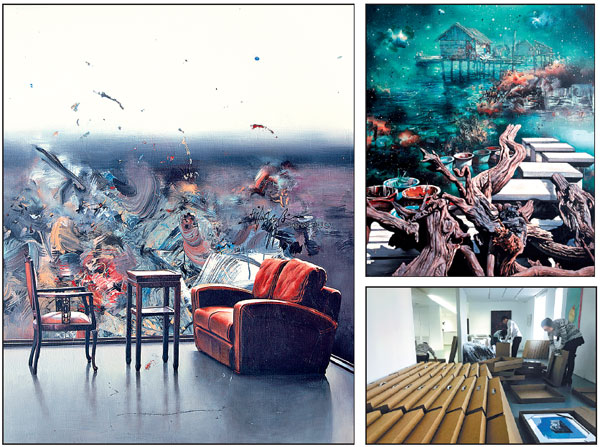Swipe a finger and access art
By Deng Zhangyu (China Daily) Updated: 2017-02-21 07:43The past few months have seen the appearance of many online and mobile platforms in China that are proving a boon for young and established artists, and a great way for the public to buy pieces at affordable prices. Deng Zhangyu reports.
In the past six months, Beijing-based painter Zhong Biao has sold limited-edition prints of his oil painting Samadhi using an art app Ywart, at prices ranging from 699 yuan ($102) to 899 yuan based on the sizes of the prints.
He has also put some of his oil paintings for sale on the mobile-art trading platform.
Although none of his oil paintings priced at more than 250,000 yuan have sold online yet, Zhong is confident about striking a deal soon.
|
Above and top right: Oil paintings by Zhong Biao. The limit-ededition prints sell well on an online art-trading platform. Above right: Staff members pack works for sale on the Ywart mobile-art platform. Photos Provided to China Daily |
The 49-year-old has held solo shows in China and abroad, but using the app is his first attempt to sell works online.
"Online art trading is inevitable. We have to do it and be patient," says Zhong, who is known for creating multidimensional worlds on canvas.
Last year saw the appearance of many online and mobile-art platforms in China.
The app buybuyart was launched last year by Jin Jun, deputy director of the design school of the Central Academy of Fine Arts.
Within six months, the platform had about 1,000 artists, most of whom were young art college graduates.
Now, there are nearly 3,000 artists registered on the app. But some, especially established ones, use it only to show their works, says Jin.
The prices of the works sold on the app range from 1,000 to 5,000 yuan, which Jin says is what a Chinese first-time buyer is typically willing to pay.
Jin says one of the main reasons the online art market is taking off is that it is almost impossible for ordinary Chinese to buy art sold through traditional sources like galleries and auction houses. The convenience of mobile payment and fast delivery make the apps an easy way for millions of mobile users to access art easily.
"In the West, even people living in rented apartments buy art for decoration or just enjoyment. And, now, with people in China getting bigger houses, they are spending money on decorating them," says Jin.
Jin, who leads a team of about 20, says the number of registered users on his app has continued increasing since it was launched last year. Most are from big cities like Beijing and Shanghai.
"We need to be patient. It takes time for people to buy art for home decoration," he adds.
The mobile-art platform works for young artists, who sell prints of their works as it lets them sell their works at affordable prices.
Meanwhile, the sale of limited-edition prints also does well on Ywart, an online art platform that also has an app.
Zhong, the oil painter, sells a lot of prints of his works.
Ywart founder and former museum director Zhu Tong says a client once bought 900 prints of an established artist's work.
Then, in January, another client ordered 350 prints of a particular work as gifts for her company's clients.
The client told Zhu that she was bored of buying scarves or tea as gifts and never imagined that works from renowned artists could be so affordable.
"The demand for art is always there, but we fail to meet it. With mobile technology, people can access high-quality art easily," says Zhu.
Zhu says the number of users has crossed 10,000. Many buy original works that are priced from 5,000 to 50,000 yuan.
Zhu says abstract works and those with bright colors are favored by buyers who mainly buy art for decoration. A user from Changsha in Hunan province bought three works worth more than 200,000 yuan.
Zhu has also opened physical stores in big cities, including in Nanjing, Suzhou and Shenzhen. He also works with real estate companies and hotels to help them decorate.
"People see art pieces at our stores or spaces and they then turn to our app to buy them," he says.
"The market is huge and will continue to grow. It is just like sitting atop a volcano waiting for it to erupt."
According to a report on the online-art trade by insurer Hiscox, online art sales hit a record high of $3.27 billion in 2015,which sets the market on course for sales of $9.58 billion by 2020.
Separately, the mobile-art market is also drawing traditional dealers.
In March, Zhu says his app will collaborate with 10 galleries in China and some collectors to sell high-end pieces online, including works by big names like Wu Guanzhong, an oil painter whose works often fetch millions of yuan.
Zhu says his ultimate goal is to offer quality art to anyone with an internet connection and a smartphone.
"Stop saying that the Chinese don't have a taste for art. All they need is a good channel to access it," he says.
Contact the writer at dengzhangyu@chinadaily.com.cn
- 'Cooperation is complementary'
- Worldwide manhunt nets 50th fugitive
- China-Japan meet seeks cooperation
- Agency ensuring natural gas supply
- Global manhunt sees China catch its 50th fugitive
- Call for 'Red Boat Spirit' a noble goal, official says
- China 'open to world' of foreign talent
- Free trade studies agreed on as Li meets with Canadian PM Trudeau
- Emojis on austerity rules from top anti-graft authority go viral
- Xi: All aboard internet express












